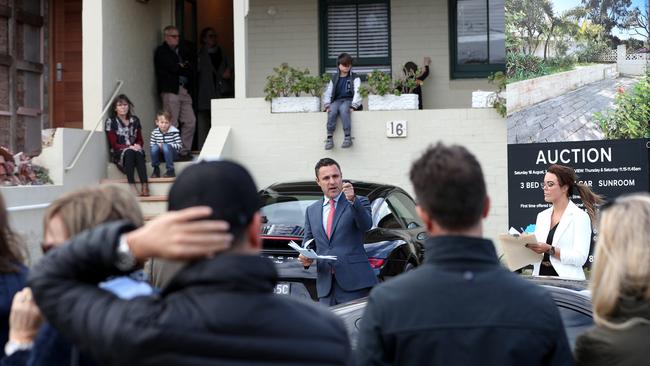Barefoot Investor: Afterpay is financial weed, don’t get hooked
Afterpay is like the financial equivalent of marijuana because it acts like a gateway financial drug — training young people to rely on the bank’s money rather than banking on themselves, writes Barefoot Investor.

Barefoot Investor
Don't miss out on the headlines from Barefoot Investor. Followed categories will be added to My News.
I think of Afterpay as the financial equivalent of marijuana.
Young people absolutely love it, while old people are doing a lot of finger-waving about the dangers of getting hooked on the newest financial drug to hit the streets.
This week, the financial equivalent of a teacher, ASIC, busted into the school locker rooms (quick, hide the bongs!) and attempted to clear the air by holding its first review of the phenomenon that is “buy now pay later”, otherwise known as “young people’s lay-by”, otherwise known (by me) as “financial weed”.
AFTERPAY, ZIPPAY CAN LEAVE CUSTOMERS WORSE OFF
AFTERPAY, ZIPPAY: IS BUY-NOW, PAY-LATER A GOOD OR BAD IDEA?
Here’s some of what ASIC found:
Most Afterpay customers are Millennials.
One in six of them are in financial strife … getting overdrawn, delaying bills or borrowing more.

And these services are really hot: the number of transactions has risen from 50,000 a month in April 2016 to 1.9 million in June 2018, with the collective tab now at a whopping $900 million plus.
Now, understand there’s nothing really revolutionary about Afterpay — men in grey suits have been dreaming up new ways to get people to spend money they don’t have since long before Bob Marley rolled his first spliff. This is just the latest incarnation.
(Case in point: when I was at uni the bank gave me a student banking package that bundled in a credit card with a $3000 limit “just in case”, and effectively trained me to see their credit limit as my money.
See? Same, same but different. Even the excuses are similar: “Oh, but if I pay off my credit card in the 55-day period, it’s free!”)
My opinion?
The actual terms on Afterpay are not that bad.
As long as you pay off your instalments on time, you won’t be charged any interest or fees. So, as far as consumer credit drugs go, it’s not too heavy.
Your financial life won’t be ruined by taking out a few Afterpay loans. So chillax, right?
Well, no. See, the reason I compare Afterpay to weed is that it acts like a gateway financial drug: it’s effectively training young people to rely on the bank’s money rather than banking on themselves.
Case in point: Afterpay claims its average purchase is $150.
A hundred and fifty clams!
Seriously, if you need instalments to cover $150, you need to check yourself before you wreck yourself.
And, once you get hooked on spending someone else’s money, there’s every chance you might graduate to harder stuff — other Millennial credit-drug dealers who really rip you off.
Who knows? Maybe in the future we’ll have before and after photos like they do with meth heads:
Before: This is a fresh-faced Emma, aged 18, buying a pair of pink pumps on Afterpay.
After: This is a stressed-out Emma, aged 23, buying scratchies with her Nimble loan.
Seriously, you’re never going to win if you don’t learn to stand on your own two feet and pay your own way.
And that’s why the “buy now, pay later” phenomenon … is true to label.
Get hooked on this junk and you’ll pay a very high price later.
Tread Your Own Path!

Q & As
MIND THE SMALL PRINT
LOUISE ASKS: I am hearing a lot of advertising for SuperSuper — a shopping rewards program that pays rewards directly to your super account with GuildSuper.
It’s targeting women, enabling us to boost our super balances by doing nothing different — we are shopping anyway. What are your thoughts on this?
BAREFOOT REPLIES: I actually heard SuperSuper advertised on the radio, and my first thought was: “Well, this sounds like the financial equivalent of a Spice Girls song”.
Girl Power! Yeah! We can shop and save for our super!
So I’ll tell you what I want, what I really, really want.
I want a super fund that doesn’t zig-a-zig-ah: GuildSuper has underperformed an average super fund over one, three, five, seven and 10 years, according to SuperRatings.
I assume this is because their fees are a little, shall we say, Scary Spice. At 1.38 per cent per annum plus $95 a year. Bottom line? Any money you save from their slick shopping campaign, you’ll give back in higher fees and lower returns (and then some).
So, if you want to be my (super) lover, you’ve got to get with my plan.
By all means score rewards from shopping, but you don’t need GuildSuper to do it (though hats off to GuildSuper for making it super … simple).
All you need to do is Google “Woolworths discount cards” and you can get 5 per cent off your shopping.
(Tight-arse tip: most retailers offer these discounts if you buy their gift cards or
e-vouchers … because they bank on a certain percentage of people losing the cards or forgetting about them, and they’ll pocket the money.)
Then, take your savings and make a contribution into an ultra-low-cost index super fund.
Spice up your life!
DON’T WAIT TOO LONG
DEE ASKS: I would like your thoughts on something that is bothering me. Forecasters think house prices will fall at least 5 per cent over the next year.
If you buy a million-dollar house now, in a year you will have paid 4 per cent stamp duty upfront and 4 per cent interest in servicing — and suffered a 5 per cent drop in value. That’s 13 per cent gone, wiping out more than half of a 20 per cent deposit!
Isn’t renting at a 3 per cent to 4 per cent yield better? Should there be a “Barefoot Warning” that rent money sometimes is not wasted?
BAREFOOT REPLIES:
My warnings for first home buyers aren’t about falling property prices, but rising interest rates.
I devoted an entire chapter to it in my book: it’s called “The Curious Case of the Postcode Povvos” … first-home buyers who live in cafe suburbs … but can’t afford a coffee because they’re slaves to their mortgages.
In that regard, I totally agree that rent money is not dead money if you can’t afford to comfortably service a mortgage and have a commonsense buffer for higher interest rates (which will come at some stage in the next decade).
My view?
With falling prices, there is absolutely no rush to buy your first home. Yet don’t get paralysis by analysis. You’ll pay stamp duty and interest whenever you decide to buy. So, once you find a home you love, that you can afford, and that you will live in for at least a decade, buy it.

REFUND CUT AND DRIED
NICK ASKS: This question is for my brother. After being diagnosed with serious bone cancer in March 2017, he proceeded to apply to his travel insurer — Southern Cross Travel — for a refund on his overseas trip, planned for April 2017.
But Southern Cross has refused to pay up the $4000. His doctors are at a loss as to why they won’t pay — fairly cut and dried they thought. How damn sick do you need to be? Please help!
BAREFOOT REPLIES: I read through Southern Cross’s Product Disclosure Statement.
It’s pretty clear: “This policy automatically includes cover … for actual and reasonable losses incurred by you because of an unexpected event, if you have to cancel or change the dates of your journey before leaving Australia”.
And it details one of the “unexpected events” as the “diagnosis of a terminal condition, or a condition requiring radiotherapy or chemotherapy”. They say they’ll pay up to $2500 on a single trip.
Like your brother’s doctors say, it seems pretty cut and dried, so perhaps I’m missing something.
Or maybe it’s Southern Cross that’s missing something.
Most big companies have sophisticated media tracking systems that alert them to when their names are mentioned in the media.
So, since this column is being published across the country, maybe they’ll pick it up.
Just in case, let’s throw in a few keywords: “Southern Cross Travel Insurance Fair Suck of The Sav”.
Let’s see if Southern Cross Travel Insurance reviews your brother’s case and, if he’s in the right, pays the claim.
Over to you, Southern Cross Travel Insurance.
If you’ve got a burning money question, visit barefootinvestor.com and #ASKBAREFOOT
The Barefoot Investor for Families: The Only Kids’ Money Guide You’ll Ever Need (HarperCollins)
RRP $29.99. Available now in all good bookstores and online
The Barefoot Investor holds an Australian Financial Services Licence (302081). This is general advice only. It should not replace individual, independent, personal financial advice.
Originally published as Barefoot Investor: Afterpay is financial weed, don’t get hooked


